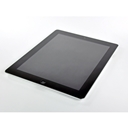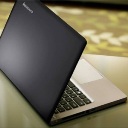In the new world of portable computing, which type of system represents the best all-around choice for legal professionals?

Image: Walter Galan

Lenovo IdeaPad U400
Image: Lenovo
Image: Lenovo
With tablets and ultrabooks both offering a potent combination of power, speed, and convenience, which system is the best choice for lawyers searching for a portable companion to take along to conferences, meetings, courts, and other places? The answer can be summed up in just one word: both.Tablet systems have become incredibly popular over the past couple of years, inspiring a growing number of lawyers to reconsider their decades-long attachment to notebook computers. Meanwhile a fresh generation of notebooks -- dubbed "ultrabooks" -- are emerging as a new type of smaller, lighter, more powerful, and highly versatile portable computer.
"As an attorney who travels frequently between our offices in New York, the District of Columbia, and Virginia, I am an avid user of both pieces of technology," says Greg Rinckey, managing partner at Tully Rinckey, an Albany, N.Y., law firm. "They each serve their own special purpose to a point where the other technology just cannot pick up the slack."
SIMILAR YET DIFFERENT
Tablets and ultrabooks share a number of similarities. Both are designed along minimalist principles, featuring
compact screens (generally ranging from about 7 to 13 inches diagonally) and a limited number of interfaces for peripheral devices, e.g., the iPad has no USB or HDMI interfaces. Meanwhile, virtually all tablets and most high-end ultrabooks use chip-based solid state drives (SSDs) instead conventional hard drives. This approach saves space, conserves power, accelerates data access, and improves reliability.
On the downside, most SSDs write data slower and cost several times as much as an equivalent hard drive (although SSD costs are plummeting rapidly). For this reason, most tablets and ultrabooks feature a limited amount of storage space, forcing users to rely on cloud computing and other storage management techniques. SSDs also have a limited life expectancy of erase-write cycles, after which it no longer performs reliably. A hard drive, on the other hand, may be able to deliver ten or more years of dependable operation. But note that when an SSD dies it simply stops writing data -- existing information is usually still available.
From an operational standpoint, the biggest difference between tablets and ultrabooks is that the former primarily relies on touch-screen commands while the latter focuses on keyboard and mouse or track pad control. Tablets and ultrabooks also part ways on operating systems. Ultrabooks run conventional operating systems such as Windows, Macintosh OS X, or Linux. Most tablets are based on either the Apple iOS or Google's Android platform. Microsoftrecently demonstrated a prototype of its new tablet computer, named Surface, which will have a professional edition driven by Windows 8 and a consumer edition driven by a Windows RT.
Streamlined operating systems, SSDs, and advanced power management techniques enable tablets and many ultrabooks to start virtually instantaneously. Rinckey says that having almost immediate data availability without seriously draining battery life can be a lifesaver in the courtroom. "When a judge calls our case I can't say, 'Excuse me, judge,' as I wait for my laptop to boot up," he observes.
SOFTWARE SUPPORT
Perhaps the biggest advantage ultrabooks have over tablets is the ability to run the same program in the same basic screen configuration that a lawyer uses on his or her office computer. Tablets on the other hand, are limited to running specially designed apps that look and behave differently from most desktop and notebook programs. More discouraging is the fact that many software publishers, including those serving the legal community, have yet to offer iOS or Android versions of their products.
A tablet's inability to run desktop or notebook applications can greatly handicap a lawyer who needs rapid access to critical information. "Unfortunately, this is where there's still a big gap by enterprise software vendors," says Greg Miliatis, principal at StreamLine, a technology consulting business that serves the legal market, based in Albuquerque, N.M. "Since the most common [law] firm applications are not cloud-based, it makes it more difficult for attorneys to get all the value they could from tablets."
Attorney Arif A. Mahmood, who works in pharmaceutical intellectual property litigation in Toronto, says that limited software support hampers serious document management on tablets. "To actually have access to a full case, you would have to move over hundreds of documents and there are few if any apps that are really good at managing those kinds of documents," he says.
Rinckey points out that some types of connectivity can also be a headache on a tablet. "The tablet, while great to access the internet, doesn't really support our firm's virtual private network very well," he says. "VPN on the tablet is just not user friendly yet and, in those cases when I need to access the company's main system, I'll access it through my ultrabook."
TORTURE TYPING
Any lawyer who plans to use a tablet to take notes during a meeting or work on important documents during recess will want to think twice about using a tablet. Typing on a glass screen is at best awkward and, when done for an extended period of time, can be downright painful. While most tablets are able to connect wirelessly to an external keyboard, dragging along additional hardware that may be larger than the tablet itself doesn't fit anybody's definition of convenience.
Ultrabooks, on the other hand, usually feature a decently sized clickable keyboard that often feels as comfortable as typing on a desktop computer keyboard. On some ultrabooks, such as the Macintosh Air, the keys are backlit for enhanced visibility in limited light settings.
Rinckey says that he wouldn't even think about doing any sort of serious document editing on a tablet. "If I need to draft a document, or even update billing, a tablet will not suffice," he states. "For all drafting and heavy editing of documents, an ultrabook is a must."
COST COMPARISON
While one can spend upwards of $1,500 on a Macbook Air, an entry level model costs $500 less. Meanwhile, Lenovo's IdeaPad U-series Ultrabooks, introduced in mid-June, start at $750. Ultrabooks recently announced by Asus, Sony, and Toshiba are also moderately priced, beginning at just $600. At the high end, ultrabook prices peak at approximately $2,000.
On the tablet side, iPad prices range between $499 and $829. Android tablets can be purchased for as little as $200 and upwards of $1,000, depending on screen size and other factors. According to a report from IMS Research, the average sales price of tablets was $386 during the first quarter of 2012, a 21-percent drop compared to the same period last year.
CONCLUSION
Given the crucial roles information and communication play in a lawyer's life, Rinckey feels that many will ultimately want to invest in both technologies. "I would recommend a tablet for the courtroom and keep your ultrabook in the hotel room, home, office, or anyplace where drafting and heavy editing of documents is required," he says. "I don't think you can solely rely on one or the other."
visit : www.mtmit.co.cc
ReplyDelete